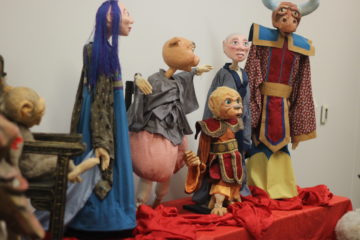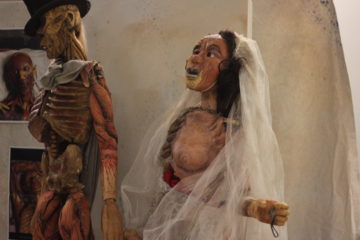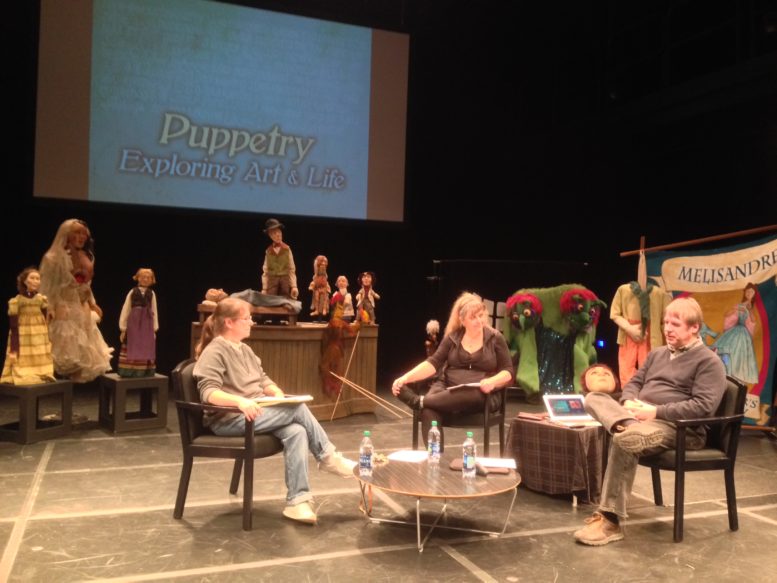By DAVID DUPONT
BG Independent News
Two things were clear during the conversation on Puppetry: Exploring Life & Art. Puppets aren’t just for kids, and puppeteers are tired of having writers point out that puppets are not just for kids.
The panel came on the eve of ArtsX at Bowling Green State University.

Puppets used in BGSU productions.
Kelly Mangan, the prop master for the Department of Theatre and Film, facilitated the talk between Mel Hatch Douglas, a 1998 BGSU graduate and associate artistic director of Madcap Puppets, and Bradford Clark, puppet master, scholar, and museum curator.
The spoke in the Eva Marie Saint Theatre with a backdrop of some of the puppets in their lives.
In some traditions, puppets are considered alive. Mangan remembered first meeting Clark, long before either joined the BGSU faculty. She was 19, and she remembered Clark blowing incense into the eyes of puppets. This came, he said, from his studies in Bali.
“At that point, they became people,” she said. “As a prop person in order to put them back into storage, we had to take the life out. Until then we treated them as people.”
For a 19-year-old, this was magic. She’s retained her love of puppets and has used them in her work. “I look at a script and help a director tell that story.” Sometimes that involves elements of puppetry. For a Huron Playhouse production of “The Wizard of Oz,” she used elaborate shadow puppets as scenery.

Frankenstein and his bride design by Bradford Clark.
Clark recalled his own initiation into puppetry. He loved it as a kid growing up in California. His fourth grade teacher brought in a stage so he could present marionette shows. Right before heading off to college he took a job at an old theater in the Carmel Valley run by two veteran puppeteers and his passion was fully aflame. The focus of his studies has been the use of puppets around the world, both in theater and ritual.
Douglas came to puppets relatively late. She delayed graduating from BGSU by touring as an actress. When she finally graduated in 1998, some six years after her class, she was beginning to tire of the traveling actor’s life. She was offered a job at MadCap in 2000 and has been there since.
The troupe she noted hires actors, and then trains them as puppeteers.
She brought MadCap to campus for ArtsX where the troupe presented its shadow puppet treatment of Igor Stravinsky’s “Firebird.” That show was geared to adults, while the troupe earlier on Saturday presented at the Wood County Library.
In a wide-ranging discussion, the trio discussed the multiple ways puppets are used.
Clark said that puppetry became so closely related to children’s entertainment fairly recently. In the 1950s, as television was emerging there was a need for cheap programming and acts such as “Kukla, Fran, and Ollie” fit the bill. Before then children loved puppets, but the show were geared for the whole family.
Even Jim Henson, creator of the Muppets, started out creating skits for adults, Clark said, before getting involved with “Sesame Street.”
During its first season, “Saturday Night Live” featured skits with Muppet like puppets.
Clark, who works closely with the Henson family at the Center for Puppetry Arts, said that the show’s staff really didn’t like the segments. Henson quit when he moved to England to create “The Muppet Show.”
Puppets have embedded themselves into popular culture, from the original Yoda, and Terminator, to “Team America” and the Broadway hit “Avenue Q,” which is definitely geared toward adults.
Beyond entertainment, puppets have been used in politics.
The Bread and Puppet Theater, created by German sculptor Peter Schumann, was a staple in anti-war protests in New York in the 1960s.
Clark recalled a satirical Russian program that used puppets to depict Russian leaders. Vladimir Putin was so enraged he had the network nationalized, and the owner imprisoned.
Puppetry has also proved useful in therapy. Clark said that The Muppets attract children on the autism spectrum. The puppets faces display less complex emotions and are simpler to read.
Also, Mangan said, “puppets can do and say things we’re not supposed to. It comes back to therapy. … People behind a puppet can say things they wouldn’t ordinarily.”
Conversely, Douglas said, kids will say things to puppets they would normally share. Because the puppets won’t judge them.
Clark has even witnessed puppets in China being use to exorcise bad spirits from a house. It was like spring cleaning, he said. “It’s just what you do.”





